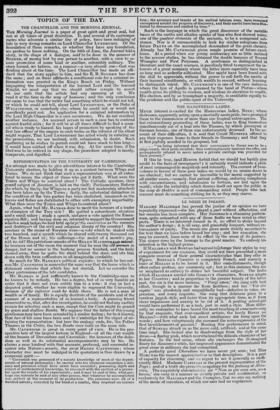REPRESENTATION OF THE UNIVERSITY OF CAMBRIDGE.
AN attempt was made to give adventitious interest to the Cambridge University election, by holding it up as a contest between Whigs and Tories. We do not think that such a representation was at all calcu- lated to insure the object of those who put it forth. What were the Tories and Whigs to contend about ? The Catholic question, their grand subject of disunion, is laid on the shelf; parliamentary Reform (to which, by the by, the Whigs as a party are but moderately attached) has been taken up by the Tories ; lastly, the substantial distinction in the condition of the two parties has been abolished, inasmuch as the loaves and fishes are distributed to either with exemplary impartiality. What then were the Tories and Whigs to contend about ? ' Again, what had Mr..BANKES done to merit the honours of a leader or champion of the. Tory side ? He quitted a subordinate situation and a small salary ; :made a speech, and gave a vote against the Eman- cipationEill ; and having done so, returned to support the Government' whiclms week beforisha had held up to-public ex.eceation as the enemies and destio-y-e'ra of the and _religious liberty of the country! His services in the cause of . Toryism were—a vote which he shared with two hundred, 'and a: Speech 'Which "he shared with twenty thousand out of the House and in ; his sufferings—the mulct of a month's pay, 83/. 6s. 8d.! His patriotism smacks of the HELEN MACDOUOUP school: he bounces out of the room the moment that he sees the old woman in danger; but no sooner is the busking process finished, and the body stowed away, than he quits his stand behind the door, and sits him down with the twin suffocators in all imaginable cordiality. So much for Mr. BAINIKES'S political exploits; in which he has out- run Mr. CAVENDISH in somewhat the same way that the horse which is distanced outruns that which has not started. Let us consider the other, pretensions of the late candidates. Mr. BANKES is just sufficiently known to the Cambridge-men to be known to be nobody. He has a degree, but of so very humble an order that it does not even entitle him to a vote : it was in fact a disputed point, whether he were eligible to' represent the University, because of the inferior rank he holds there. He is not a man of wealth or of family. He is equally destitute of the accidents and of the essence of a representative of so learned a body. A punning friend observed to us, that, after due investigation, he could not find any earthly reason for selecting such a man, except that the Cam might be graced by green and shallow Banks. We suppose that the father of this young gentleman may have been actuated by a similar feeling; for be it known, that two of his sons have been sent to Cambridge for the object of ob- taining the representation : but here the analogy ends, for, !ike Father Thames in the Critic, the two Banks were both on the same side.
Mr. CAVENDISH is great in every point of view. He is the pro- spective heir of the largest fortune in England—of all the vast wealth of the houses of Devonshire and Cavendish : the honours of the duke- dom as well as its substantial accompaniments may be his. He claims a near kindred with that accurate, profound, and successful in- quirer into Nature's secrets, the great HENRY CAVENDISH; whose character (we must be indulged in the quotation) is thus drawn by a congenial spirit :— " Cavendish was possessed of a minute knowledge of most of the depart- ments of natural philosophy ; he carried into his chemical researches a deli- cacy and precision which have never been exceeded; possessing depth and extent of mathematical knowledge, he reasoned with the caution of a geome- ter upon the results of his experiments ; and it may be said of him, what per- haps can scarcely be said of any other person, that whatever he accomplished was perfect at the moment of its production. His processes were all of a Meshed nature; executed by the hand of a master, they required no correc. tion ; the accuracy and beauty of his earliest labours even, have remained unimpaired amidst the progress of discovery, and their merits have been illus. trated by discussion and exalted by tune."
Such is the language in which the 'great discoverer of the metallic bases of the earths and alkalies speaks of him who first showed water, one of the quatuor elenzenta of the ancients, to be a compound sub- stance. Nor is it unreasonable to look for similar eulogiurns front future DAVYS on the accomplished descendant of the great chemist. Already has Mr. CAVENDISH given ample promise of future excel- lence. At a period when our young aristocracy are so little inclined to the severer studies; he has obtained the double honours of Second Wrangler and First Prizeman. A gentleman so distinguished in literature and the exact sciences, is peculiarly fitted to represent the in- terests of a great seminary where the latter more especially have been so long and so ardently cultivated.. Men might have been found with the skill to appreciate, without the power to call forth the merits of their learned constituents, or with wealth to reward, without learning to distinguish talent. Mr. Cavasmistes is one of the rare instances where the lyre of Apollo is gemmed by the hand of Plutus—where wealth gives its gilding to wisdom, and wisdom its elevation to wealth. His election, and by so triumphant a majority, is creditable equally to the prudence and the public-spirit of the University.


















 Previous page
Previous page